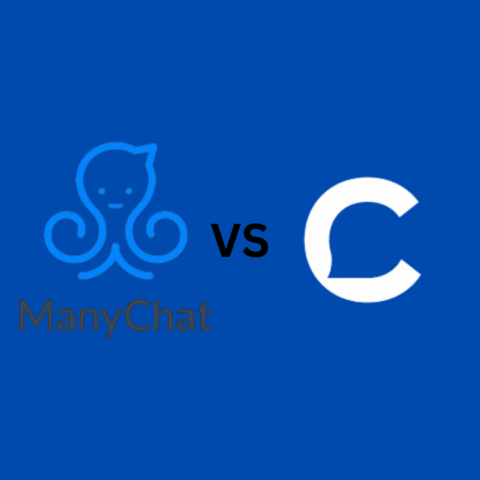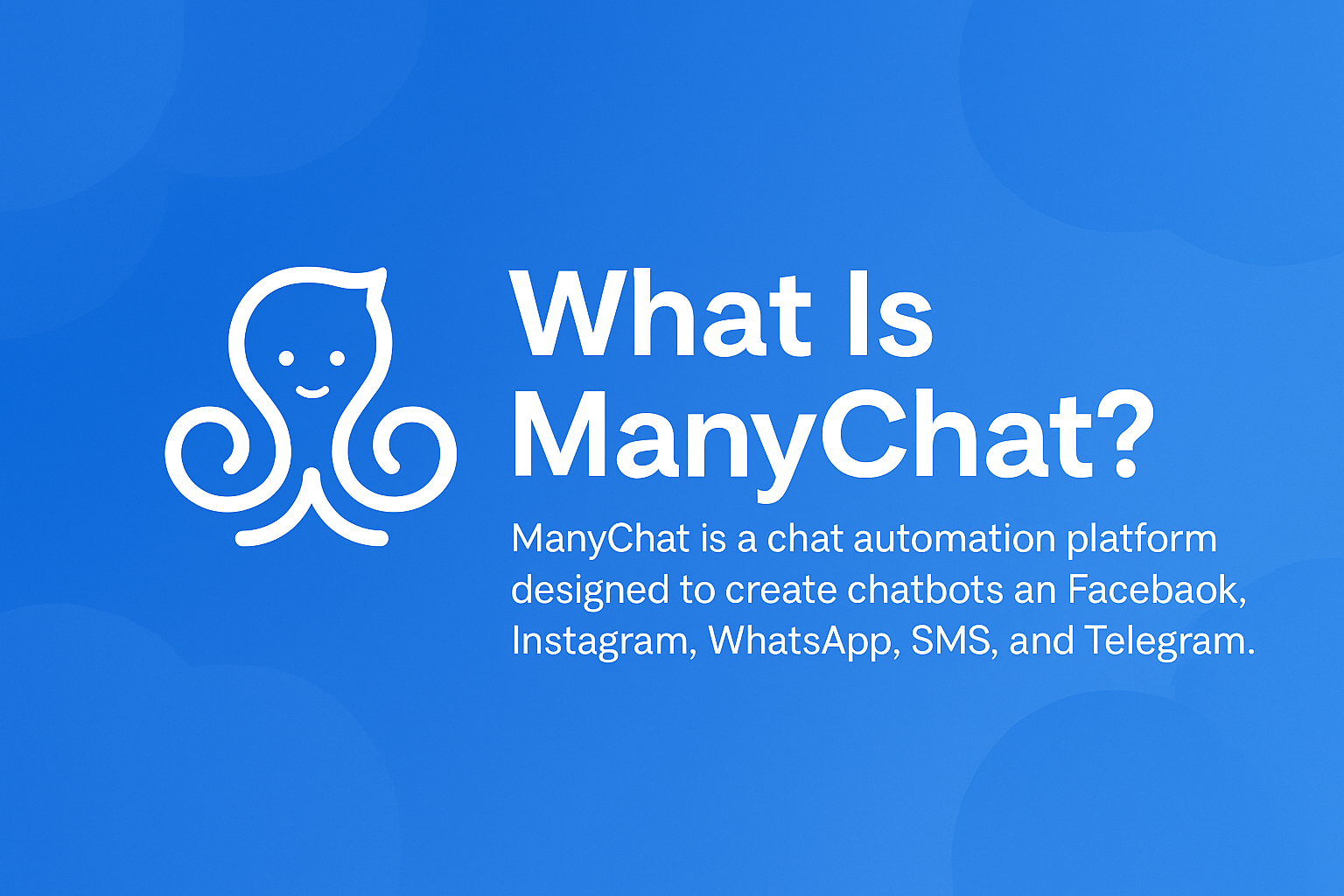Manychat vs Chatfuel: Which platform is better in 2025?


ManyChat and Chatfuel are two of the most popular platforms for building chatbots on WhatsApp, Instagram, and Facebook—with zero coding required. That means anyone, even without technical experience, can create powerful automated conversations to boost engagement and conversions.
But which one is right for you?
- What are the key differences?
- Which is easier to use?
- And which one delivers better results in 2025?
In this in-depth comparison of ManyChat vs. Chatfuel, you’ll find honest insights based on 4+ years of hands-on experience using both platforms.
🆚 Feature Comparison: ManyChat vs Chatfuel
| Feature | ManyChat | Chatfuel |
|---|---|---|
| Best For | eCommerce, Influencers, Small-Medium Businesses | Enterprises, Agencies, Developers |
| Ease of Use | Very beginner-friendly, visual drag-and-drop builder | Easy to use but more technical for custom flows |
| Platform Support | Facebook, Instagram, WhatsApp, SMS, Telegram | Facebook, Instagram, WhatsApp, Telegram |
| AI & NLP | Built-in AI + ChatGPT plugin integration | Strong NLP, GPT-based capabilities |
| Templates | 100+ ready-to-use industry templates | 50+ templates; some require customization |
| User Segmentation | Advanced, with behavior tagging | Basic to advanced segmentation |
| E-commerce Integrations | Shopify, WooCommerce, Stripe, Zapier | Shopify, Zapier, custom API options |
| Analytics & Insights | Built-in performance and automation analytics | Advanced analytics for enterprise use |
| Free Plan Available | ✅ Yes | ✅ Yes |
| Starting Paid Plan | $15/month | $15/month |
| Support | Live chat, email, tutorials | Email, tutorials, dedicated support (Pro plans) |
| Voice & AI Video Features | Voice cloning, video narration, storytelling videos | Basic AI chat only |
💡 Verdict: Which One Should You Choose?
- Choose ManyChat if you’re looking for a user-friendly platform with strong marketing automations, especially for eCommerce, affiliate marketing, or influencer content.
- Go with Chatfuel if you’re running a large business, need custom API solutions, or want deeper control for enterprise-level automations.
Manychat vs Chatfuel: Which platform is better in 2025?

1. User Interface & Ease of Use
ManyChat:
- Uses a drag-and-drop Flow Builder that makes it intuitive for beginners.
- The UI is clean and modern with guided tutorials.
- Offers a visual map to see how messages connect, which is useful for complex sequences.
Chatfuel:
- Uses “blocks” and AI rules that require more setup.
- While it’s also no-code, the UI feels slightly more technical.
- Better suited to users who are comfortable with logic-based structures.
Verdict: ManyChat is more beginner-friendly, while Chatfuel offers more control for those with a technical background.
2. Chatbot Elements & Logic
ManyChat:
- Supports messages, conditions, actions, delays, randomizers, and smart delays.
- Provides a full logic-based flow with easy event-based triggers.
Chatfuel:
- Offers blocks, sequences, AI rules, and JSON API for complex logic.
- Slightly more flexible for custom use cases using APIs.
Verdict: Chatfuel is more customizable for advanced users; ManyChat is great for streamlined chatbot logic.
3. Contact Management
ManyChat:
- Offers visual segmentation, user tagging, and custom fields.
- Real-time view of user activity and attributes.
Chatfuel:
- Provides tagging and user attributes but lacks the visual CRM feel of ManyChat.
- Requires external tools or API for deep segmentation.
Verdict: ManyChat has more robust and user-friendly contact management.
4. AI & Automation Features
ManyChat:
- Basic AI-powered keyword detection.
- Does not offer true NLP (natural language processing).
Chatfuel:
- Supports simple NLP rules and AI rule creation.
- Can integrate with Dialogflow for more advanced AI capabilities.
Verdict: Chatfuel wins for deeper AI integration.
5. Live Chat
ManyChat:
- Includes a live chat inbox with notes, tagging, and custom fields.
- Supports assigning conversations to agents.
Chatfuel:
- Includes live chat, but it’s not as feature-rich or visually clean as ManyChat’s inbox.
Verdict: ManyChat offers a better live chat management experience.
6. Supported Channels
ManyChat:
- Supports Facebook Messenger, Instagram, WhatsApp (beta), Telegram, and SMS.
- Actively improving cross-channel automation.
Chatfuel:
- Supports Messenger, Instagram, WhatsApp, and Telegram.
- WhatsApp support requires custom setup and may cost extra.
Verdict: Both are comparable, but ManyChat has a more integrated multi-channel experience.
7. Growth Tools
ManyChat:
- Offers widgets, pop-ups, QR codes, landing pages, and Messenger Ref URLs.
- Easy integration with Facebook Ads.
Chatfuel:
- Similar tools but requires manual configuration.
- Fewer pre-made growth widget options.
Verdict: ManyChat provides easier and more varied tools for lead generation.
8. Integrations & Webhooks
ManyChat:
- Native integrations with Shopify, Zapier, Google Sheets, HubSpot.
- Built-in Webhook and API support.
Chatfuel:
- Strong API capabilities.
- Integrates well with Zapier, Dialogflow, and CRMs via JSON plugins.
Verdict: Chatfuel excels with APIs; ManyChat is stronger with plug-and-play native integrations.
9. Pricing
ManyChat:
- Free plan available (up to 1,000 contacts).
- Paid plans start from $15/month.
- WhatsApp and SMS have usage-based pricing.
Chatfuel:
- Free trial available.
- Paid plans start at $15/month but scale faster for advanced features.
- WhatsApp access can increase costs.
Verdict: ManyChat offers better value for startups and small businesses.
10. Analytics & Reporting
ManyChat:
- Provides performance tracking for flows, broadcasts, and opt-ins.
- Offers custom conversion events and goal tracking.
Chatfuel:
- Offers standard analytics per block and funnel.
- Advanced metrics require third-party tools.
Verdict: ManyChat has more actionable and visual analytics built in.
11. Templates & Use Cases
ManyChat:
- Dozens of templates for eCommerce, real estate, events, local businesses.
- Easy to import and customize.
Chatfuel:
- Template library available but not as varied.
- More templates geared towards developers and marketers.
Verdict: ManyChat wins for variety and simplicity in template setup.
12. Customer Support & Community
ManyChat:
- Live chat support (Pro plan), detailed docs, and a strong Facebook group.
Chatfuel:
- Email support and documentation.
- Smaller community but responsive tech support.
Verdict: ManyChat offers more robust support for beginners and professionals alike.
Final Verdict: Which One Should You Choose?
Choose ManyChat if:
- You’re a beginner or marketer who wants an intuitive, powerful chatbot builder.
- You value visual design, easy integrations, and multi-channel messaging.
Choose Chatfuel if:
- You’re a developer or tech-savvy user looking for deep customization.
- You need API flexibility or integration with NLP tools like Dialogflow.
Both are excellent platforms—but your ideal choice depends on your technical skill level and business use case.
✅ ManyChat: Pros & Cons
Pros:
- ✅ User-friendly drag-and-drop interface
- ✅ Visual chatbot flow builder with map view
- ✅ Powerful contact segmentation and tagging
- ✅ Excellent live chat experience with agent support
- ✅ Wide range of growth tools and widgets
- ✅ Easy native integrations (e.g., Shopify, Google Sheets)
- ✅ Actionable analytics and conversion tracking
- ✅ Large variety of pre-built templates
- ✅ Strong customer support and active community
- ✅ Great value for small businesses with free plan
Cons:
- ❌ Lacks advanced NLP or AI capabilities
- ❌ WhatsApp features are still in beta and limited
- ❌ Some features require Pro plan or usage-based billing
✅ Chatfuel: Pros & Cons
Pros:
- ✅ Strong AI rule setup and NLP integration via Dialogflow
- ✅ Powerful for developers with flexible APIs and JSON plugins
- ✅ Good for custom logic and automation flows
- ✅ Integrates well with advanced tools and CRMs
- ✅ Reliable chatbot performance across supported platforms
Cons:
- ❌ Interface can feel complex or technical for beginners
- ❌ Fewer native integrations than ManyChat
- ❌ WhatsApp support may require custom setup and higher cost
- ❌ Limited pre-built templates and growth widgets
- ❌ Analytics are basic unless combined with external tools


